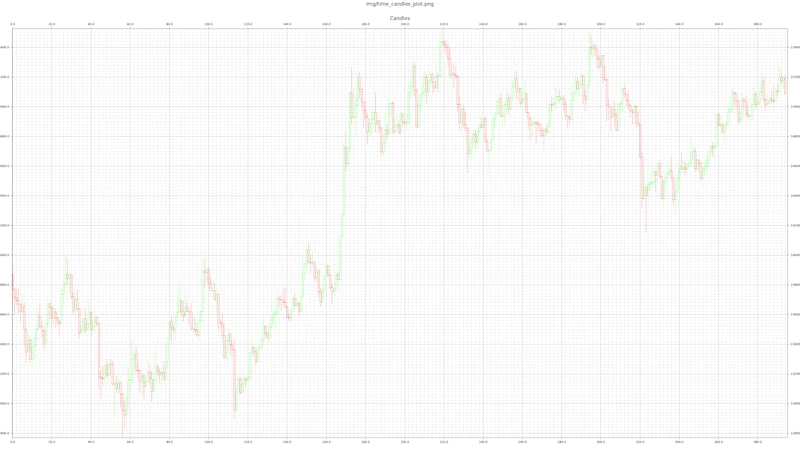36 stable releases (11 major)
| 12.0.3 | Jan 16, 2025 |
|---|---|
| 12.0.2 | Oct 29, 2024 |
| 12.0.1 | Sep 13, 2024 |
| 12.0.0 | Jun 6, 2024 |
| 1.0.0 | Feb 24, 2021 |
#6 in Finance
45 downloads per month
5MB
2K
SLoC
Trade Aggregation
A high performance, modular and flexible trade aggregation crate, producing Candle data, suitable for low-latency applications and incremental updates. It allows the user to choose the rule dictating how a new candle is created through the AggregationRule trait, e.g: Time, Volume based or some other information driven rule. It also allows the user to choose which type of candle will be created from the aggregation process through the ModularCandle trait. Combined with the Candle macro, it enables the user to flexibly create any type of Candle as long as each component implements the CandleComponent trait. The aggregation process is also generic over the type of input trade data as long as it implements the TakerTrade trait, allowing for greater flexibility for downstream projects.
See MathisWellmann/go_trade_aggregation for a go implementation with less features and performance.
Here is a sample trade series of Bitmex_XBTUSD aggregated into 15 minute candles:

Features:
AggregationRule:
The pre-existing rules in this crate include:
| 'AggregationRule' | Description |
|---|---|
TimeRule |
Create candles every n seconds |
AlignedTimeRule |
Same as TimeRule but candles are aligned to the start of a period |
VolumeRule |
Create candles every n units traded |
TickRule |
Create candles every n ticks |
RelativePriceRule |
Create candles with every n basis points price movement (Renko) |
If these don't satisfy your desires, just create your own by implementing the AggregationRule trait,
and you can plug and play it into the GenericAggregator.
CandleComponent:
These pre-existing 'CandleComponents' exist out of the box:
| 'CandleComponent' | Description |
|---|---|
Open |
Price at the beginning of a candle |
High |
Maximum price during the candle |
Low |
Minimum price during the candle |
Close |
Price at the end of a candle |
Volume |
The cumulative trading volume |
NumTrades |
The number of trades during the candle |
AveragePrice |
The equally weighted average price |
WeightedPrice |
The volume weighted price |
StdDevPrices |
Keeps track of the standard deviation of prices |
StdDevSizes |
Keeps track of the standard deviation of sizes |
TimeVelocity |
Essentially how fast the candle was created time wise |
Entropy |
Binary Shannon entropy using the trade side as inputs |
Trades |
Just returns the observed trades during that candle |
And again, if these don't satisfy your needs, just bring your own by implementing the CandleComponent trait and you can plug them into your own candle struct.
How to use:
To use this crate in your project, add the following to your Cargo.toml:
[dependencies]
trade_aggregation = "12"
Lets aggregate all trades into time based 1 minute candles, consisting of open, high, low and close information. Notice how easy it is to specify the 'AggregationRule' and 'ModularCandle' being used in the process. One can easily plug in their own implementation of those trait for full customization. This examples uses an online style approach to update with each tick:
use trade_aggregation::{
candle_components::{Close, High, Low, Open},
*,
};
#[derive(Debug, Default, Clone, Candle)]
struct MyCandle {
open: Open,
high: High,
low: Low,
close: Close,
}
fn main() {
let trades = load_trades_from_csv("data/Bitmex_XBTUSD_1M.csv")
.expect("Could not load trades from file!");
// specify the aggregation rule to be time based and the resolution each trade timestamp has
let time_rule = TimeRule::new(M1, TimestampResolution::Millisecond);
// Notice how the aggregator is generic over the output candle type,
// the aggregation rule as well as the input trade data
let mut aggregator = GenericAggregator::<MyCandle, TimeRule, Trade>::new(time_rule, false);
for t in &trades {
if let Some(candle) = aggregator.update(t) {
println!(
"candle created with open: {}, high: {}, low: {}, close: {}",
candle.open(),
candle.high(),
candle.low(),
candle.close()
);
}
}
}
Notice how the code is calling the 'open()', 'high()', 'low()' and 'close()' methods on the 'MyCandle' struct. These are getters automatically generated by the Candle macro, that have the same name as the field. In this case the 'Candle' derive macro for 'MyCandle' expands into this:
use trade_aggregation::{
candle_components::{Close, High, Low, Open},
*,
};
#[derive(Debug, Default, Clone)]
struct MyCandle {
open: Open,
high: High,
low: Low,
close: Close,
}
impl MyCandle {
fn open(&self) -> f64 {
self.open.value()
}
fn high(&self) -> f64 {
self.high.value()
}
fn low(&self) -> f64 {
self.low.value()
}
fn close(&self) -> f64 {
self.close.value()
}
}
impl ModularCandle<Trade> for MyCandle {
fn update(&mut self, trade: &Trade) {
self.open.update(trade);
self.high.update(trade);
self.low.update(trade);
self.close.update(trade);
}
fn reset(&mut self) {
self.open.reset();
self.high.reset();
self.low.reset();
self.close.reset();
}
}
See examples folder for more. Run examples using
cargo run --release --example aggregate_all_ohlc
cargo run --release --example streaming_aggregate_ohlc
Performance:
To run the benchmarks, written using criterion, run:
cargo bench
Here are some results running on a 12th gen Intel Core i7-12800H, aggregating 1 million trades into 1 minute candles:
| Candle | Time |
|---|---|
| Open | 1 ms |
| OHLC | 2.5 ms |
| All | 8 ms |
The more 'CandleComponent's you use, the longer it takes obviously.
Features
The serde feature exists which, when enabled, derives Serialize and Deserialize
TODOs:
- Make generic over the data type storing the price (
f64,f32,i64,Decimal, etc...)
Donations 💰 💸
I you would like to support the development of this crate, feel free to send over a donation:
Monero (XMR) address:
47xMvxNKsCKMt2owkDuN1Bci2KMiqGrAFCQFSLijWLs49ua67222Wu3LZryyopDVPYgYmAnYkSZSz9ZW2buaDwdyKTWGwwb

License
Copyright (C) 2020 <Mathis Wellmann wellmannmathis@gmail.com>
This program is free software: you can redistribute it and/or modify it under the terms of the GNU Affero General Public License as published by the Free Software Foundation, either version 3 of the License, or (at your option) any later version.
This program is distributed in the hope that it will be useful, but WITHOUT ANY WARRANTY; without even the implied warranty of MERCHANTABILITY or FITNESS FOR A PARTICULAR PURPOSE. See the GNU Affero General Public License for more details.
You should have received a copy of the GNU Affero General Public License along with this program. If not, see https://www.gnu.org/licenses/.

Commercial License
If you'd like to use this crate legally without the restrictions of the GNU AGPLv3 license, please contact me so we can quickly arrange a custom license.
Dependencies
~2.5–3.5MB
~59K SLoC